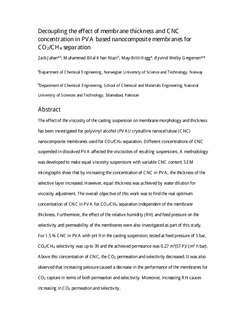Decoupling the effect of membrane thickness and CNC concentration in PVA based nanocomposite membranes for CO2/CH4 separation
Journal article, Peer reviewed
Accepted version

Åpne
Permanent lenke
http://hdl.handle.net/11250/2598020Utgivelsesdato
2018Metadata
Vis full innførselSamlinger
Originalversjon
Separation and Purification Technology. 2018, 204 220-225. 10.1016/j.seppur.2018.04.076Sammendrag
The effect of the viscosity of the casting suspension on membrane morphology and thickness has been investigated for polyvinyl alcohol (PVA)/crystalline nanocellulose (CNC) nanocomposite membranes used for CO2/CH4 separation. Different concentrations of CNC suspended in dissolved PVA affected the viscosities of resulting suspensions. A methodology was developed to make equal viscosity suspensions with variable CNC content. SEM micrographs show that by increasing the concentration of CNC in PVA, the thickness of the selective layer increased. However, equal thickness was achieved by water dilution for viscosity adjustment. The overall objective of this work was to find the real optimum concentration of CNC in PVA for CO2/CH4 separation independent of the membrane thickness. Furthermore, the effect of the relative humidity (RH) and feed pressure on the selectivity and permeability of the membranes were also investigated as part of this study. For 1.5% CNC in PVA with pH 9 in the casting suspension, tested at feed pressure of 5 bar, CO2/CH4 selectivity was up to 39 and the achieved permeance was 0.27 m3 (STP)/(m2 h bar). Above this concentration of CNC, the CO2 permeation and selectivity decreased. It was also observed that increasing pressure caused a decrease in the performance of the membranes for CO2 capture in terms of both permeation and selectivity. Moreover, increasing RH causes increasing in CO2 permeation and selectivity.
